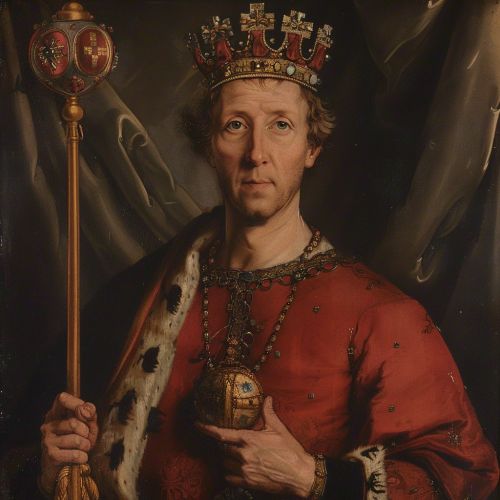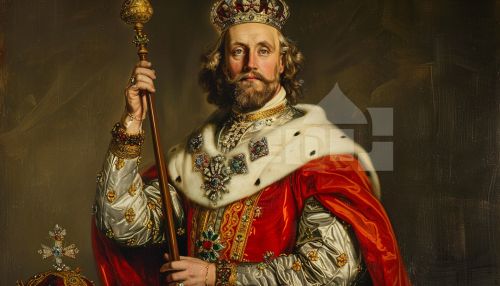John of England: Difference between revisions
(Created page with "== Early Life and Background == John of England, also known as John Lackland, was born on December 24, 1166, at Beaumont Palace in Oxford. He was the youngest son of King Henry II and Eleanor of Aquitaine. John's early life was marked by the tumultuous political landscape of the Angevin Empire, which spanned large parts of France and England. His nickname, "Lackland," originated from his initial lack of a substantial inheritance compared to h...") |
No edit summary |
||
| Line 27: | Line 27: | ||
John's legacy is a complex one. While his reign was marked by significant administrative advancements, his failures in foreign policy and conflicts with the nobility overshadowed these achievements. John died on October 19, 1216, and was succeeded by his son, [[Henry III of England|Henry III]]. His death marked the end of a turbulent reign that had lasting implications for the English monarchy and legal system. | John's legacy is a complex one. While his reign was marked by significant administrative advancements, his failures in foreign policy and conflicts with the nobility overshadowed these achievements. John died on October 19, 1216, and was succeeded by his son, [[Henry III of England|Henry III]]. His death marked the end of a turbulent reign that had lasting implications for the English monarchy and legal system. | ||
[[Image:Detail-96209.jpg|thumb|center|Portrait of King John of England in royal attire, holding a scepter and orb.|class=only_on_mobile]] | |||
[[Image:Detail-96210.jpg|thumb|center|Portrait of King John of England in royal attire, holding a scepter and orb.|class=only_on_desktop]] | |||
== See Also == | == See Also == | ||
Latest revision as of 13:25, 4 July 2024
Early Life and Background
John of England, also known as John Lackland, was born on December 24, 1166, at Beaumont Palace in Oxford. He was the youngest son of King Henry II and Eleanor of Aquitaine. John's early life was marked by the tumultuous political landscape of the Angevin Empire, which spanned large parts of France and England. His nickname, "Lackland," originated from his initial lack of a substantial inheritance compared to his elder brothers.
Ascension to the Throne
John's path to the throne was fraught with familial conflict and political intrigue. Following the death of his elder brother, Richard the Lionheart, in 1199, John ascended to the throne. His claim was contested by his nephew, Arthur of Brittany, leading to a protracted struggle for control. John's eventual victory was solidified by the Treaty of Le Goulet in 1200, which recognized his sovereignty over the Angevin territories.
Reign and Governance
John's reign was characterized by a series of administrative reforms and legal innovations. He is credited with the development of the English common law system and the establishment of the royal courts. However, his reign was also marked by significant challenges, including conflicts with the nobility, the Catholic Church, and foreign powers.
Conflict with the Nobility
John's heavy taxation and arbitrary justice led to widespread discontent among the English barons. This culminated in the rebellion of 1215, which forced John to sign the Magna Carta, a seminal document that limited royal authority and laid the foundation for constitutional governance.
Relations with the Church
John's relationship with the Catholic Church was contentious. His refusal to accept Stephen Langton as Archbishop of Canterbury led to his excommunication by Pope Innocent III in 1209. The subsequent interdict placed on England severely disrupted religious life and further alienated John from his subjects.
Foreign Policy and Military Campaigns
John's foreign policy was largely focused on maintaining and expanding the Angevin Empire. His campaigns in France, however, were largely unsuccessful. The loss of Normandy in 1204 was a significant blow to his prestige and territorial holdings. His later efforts to reclaim these territories culminated in the disastrous Battle of Bouvines in 1214.
Legacy and Death
John's legacy is a complex one. While his reign was marked by significant administrative advancements, his failures in foreign policy and conflicts with the nobility overshadowed these achievements. John died on October 19, 1216, and was succeeded by his son, Henry III. His death marked the end of a turbulent reign that had lasting implications for the English monarchy and legal system.


